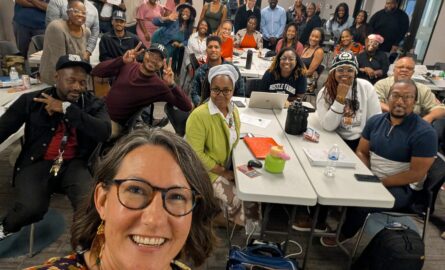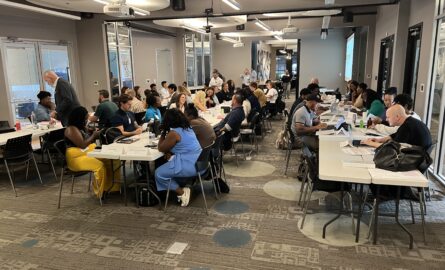In this episode of Friends of Project Healthcare…
Aaron Gani, Founder and CEO of BehaVR, joins host Eric Thrailkill to explain how his company plans to close the gap between an unbalanced supply and demand for mental and behavioral health treatments.
“The problem is the system does not have the capacity to care for those people,” he shares. “And it’s only getting worse.” Aaron reports that even established, capable organizations will wind up with a growing waitlist for psychiatric care. “And meanwhile, those people are suffering and often spiraling.”
Aaron believes the solution is to employ innovative technology and digital therapeutics. “Taking well understood therapeutic techniques, digitizing them so they can be ordered and overseen by a clinician, but actually experienced by the patient asynchronously on their own time, that is really the only way we’re gonna close that gap.”
Prior to founding BehaVR, Aaron had been creating applications and experiences with technology throughout his career in healthcare and financial services, up to and including serving as Chief Technology Officer of Humana, a Fortune 50 managed care organization.
Aaron initially joined Humana with a background in technology and took on various roles in contact centers and technology enablement. Over time, he became involved in clinical services, analytics, and care management, playing a key role in understanding members’ health and developing interventions to improve their well-being.
“My team’s job was to look out and scan the horizon, look at exponential technologies that were coming our way, figure out what and how to apply those to that mission,” he says. “Again, understanding our members better, figuring out how to intervene in their lives and improve their health.”
Deep down, Aaron always wanted to build his own business, and in 2016 made the decision to pivot to an entrepreneurial opportunity. “I got to that point in my life, I said, okay, I’m gonna do this. Spent a good bit of time thinking about what problem to solve.”
The problem haunting Aaron most was the massive unmet need in serving mental and behavioral health. He resolved to create a scalable solution to close the gap, and believed virtual reality therapeutics was the medium to do it.
“We don’t think of this as replacing clinicians. This is a force multiplier or an extender for clinicians so they can still be in a position of overseeing and really accountable for that member or patient’s care,” he explains.
The technology works by exposing a patient to a simulated experience. “Think of exposure therapy to some traumatic or problematic situation or stimuli for you,” he says. “We can very powerfully get you aroused, physiologically and emotionally. And then as we help you work through that, understand your own safety behaviors, learn that you can overcome them.”
That is digitizing exposure therapy in a very powerful way.
“The good part about VR at a fundamental level, in some ways, if you design it right, it can be even simpler than most of the technology in our lives, right? You’re in this immersive simulation, and as you move around, you can reach out and touch and engage with the environment. We all know how to do that naturally.”
“That’s different from icons and widgets and typing on keyboards and even smartphones,” he emphasizes. “This is simpler than that, as long as you keep the design simple.”
In 2022, BehaVR acquired Oxford VR, bringing into their pipeline even more effective products such as “Game Change,” which successfully addressed conditions like agoraphobic avoidance (the anxious avoidance of everyday situations).
The powerful merger allowed BehaVR to apply the success of Game Change to many other therapeutic techniques, which closes the gap in care just a little bit more. “This intervention is trans agnostic, meaning it’s useful across a broader population, including folks with PTSD, bipolar disease or other traumatic brain injuries.
The integration of Oxford VR into BehaVR also opened up opportunities with the UK’s National Health Service and collaborations with organizations like the Veterans Administration. “Oxford did some really interesting work and was an initial pilot with the Wounded Warrior Project with the most catastrophically injured veterans,” Aaron shares. That led them to apply the techniques to a new program called Mission Daybreak, which is looking for solutions to address veteran suicide.
“When you read the results and how it changed people’s lives, it’s a wow kind of moment.”
This conversation was captured at the 2023 ViVE Conference in Nashville, TN. Stay tuned for more exciting interviews from the event.
About Aaron Gani: Aaron Gani is the founder and CEO of BehaVR, Inc., creating digital therapeutics for mental and behavioral health through the unmatched psychological power of Virtual Reality. Gani has served as Chief Technology Officer of Humana, a Fortune 50 managed care organization. He has a decade+ in healthcare leading technology development of population health, utilization management, disease management programs, pharmacy benefit management, primary care, urgent care, Health IT, and clinical analytics. Gani identified the crucial gap between knowledge, tools, and activations for improving mental and behavioral health, and believes Virtual Reality experiences can close the gaps in these areas. Gani is a founding member of the Strategic Advisory Board of the Digital Medicine (DiMe) Society, and a founding advisory board member of the International Virtual Reality Healthcare Association (IVRHA). Gani holds a Master’s in Predictive Analytics from Northwestern University, an MBA, General Management and Health Sector Management from Duke University’s Fuqua School of Business, and a BS in Management/CIS from the University of Louisville.
Keep the Pulse, Friends!
LISTEN: “Follow” or “subscribe” to Friends of Project Healthcare on your favorite podcast platform.
REVIEW: Go to Apple Podcast at projecthealthcare.com/apple and leave a (hopefully) 5-star rating and creative review.
Friends of Project Healthcare Podcast
Brought to you by Nashville Entrepreneur Center



